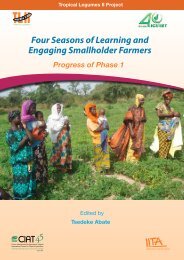Four Seasons of Learning and Engaging Smallholder Farmers - icrisat
Four Seasons of Learning and Engaging Smallholder Farmers - icrisat
Four Seasons of Learning and Engaging Smallholder Farmers - icrisat
You also want an ePaper? Increase the reach of your titles
YUMPU automatically turns print PDFs into web optimized ePapers that Google loves.
In Nigeria, the small seed pack approach was pioneered by Jirkur Seed Cooperative <strong>and</strong> the Premier<br />
Seed Company, especially across northeast <strong>and</strong> northwest Nigeria. Packs were sealed in 1 kg, 2.5 kg<br />
<strong>and</strong> 5 kg sizes <strong>and</strong> sold at 150, 400 <strong>and</strong> 600 Naira, respectively (1USD = 150). One M+E follow-up<br />
showed that the majority preferred the 2.5 kg pack, which they can afford with their domestic funds. In<br />
Niger, packs were sold in the eastern <strong>and</strong> southern parts <strong>of</strong> the country through farmers’ cooperatives<br />
unions, NGOs <strong>and</strong> in open market places. Given the very modest buying power <strong>of</strong> farmers in Niger- <strong>and</strong><br />
important role <strong>of</strong> cowpeas - the lively interest in small cowpea packs was unexpected. At the beginning<br />
<strong>of</strong> the project, NARS <strong>and</strong> NGOs considered that farmers only wanted large quantities, that is, 50 kg <strong>and</strong><br />
20 kg packs. IEAR <strong>and</strong> SARI then moved to putting on <strong>of</strong>fer 5 kg <strong>and</strong> 2 kg packs. Now, sales data have<br />
shown that many Niger farmers desire smaller amounts - even 500g <strong>and</strong> 1 kg packs, particularly as they<br />
exp<strong>and</strong> to new varieties. The same modules were adopted in Mali <strong>and</strong> Mozambique<br />
Progress in on-farm demonstrations<br />
Demonstration plots were established in all participating counties to popularize <strong>and</strong> showcase the<br />
performance <strong>of</strong> improved varieties to large number <strong>of</strong> farmers.<br />
In Nigeria, 796 farmers (659 men <strong>and</strong> 337 women) successfully established on-farm cowpea<br />
demonstration plots spread across 41 communities in the project areas <strong>of</strong> Borno, Kano, <strong>and</strong> Benue states.<br />
The average yield for the improved varieties was 1447 kg per ha, compared with 800 kg per ha obtained<br />
from the farmers’ local variety. In 2010, 30 demonstration plots were established in Benue State. The<br />
average yield ranged from 1258 to 1684 kg per ha for the improved cowpea varieties compared with<br />
1100 kg per ha that was obtained from the farmers’ local variety. This result shows the high potential <strong>of</strong><br />
cowpea in the zone.<br />
In Niger Republic, a total <strong>of</strong> 339 farmers (329 men <strong>and</strong> 119 women) demonstration plots were<br />
established in Maradi <strong>and</strong> Zinder regions. The average yield for the improved varieties was 1085 kg per<br />
ha, compared to 700 kg per ha obtained from the farmers’ local variety.<br />
In Tanzania, 28 demonstrations plots were established in 6 villages in the study districts. In Mozambique,<br />
1775 on-farm demonstration plots have been established across 16 communities in Nampula province<br />
to popularize <strong>and</strong> promote promising IITA cowpea lines. In Mali, 265 demonstrations plots were<br />
established in the project areas where average yields <strong>of</strong> 800kg per ha was reported.<br />
Progress in midseason evaluation <strong>and</strong> farmer field-days<br />
As part <strong>of</strong> activities to popularize the improved varieties, farmer field days were held in all five countries<br />
to demonstrate to large numbers <strong>of</strong> farmers, other stakeholders <strong>and</strong> the general public the performances<br />
<strong>of</strong> the improved varieties available. Over 45 mid-season evaluations <strong>and</strong> field days were held in Nigeria<br />
over the three seasons. Feedback from the mid-season evaluations <strong>and</strong> field days was given to cowpea<br />
breeders to guide them in the breeding program. In Mali, 11 field days/mid-season evaluation was held.<br />
Progress in seed dissemination<br />
In order to enhance the adoption <strong>of</strong> improved cowpea varieties, large volumes <strong>of</strong> cowpea seed were<br />
distributed to farmers in small packs <strong>of</strong> 1 kg mini kits. A total <strong>of</strong> 8.83 MT <strong>of</strong> improved cowpea varieties<br />
have been distributed to 5790 farmers.<br />
In Nigeria, about 6.33 MT <strong>of</strong> cowpea seed packaged in 1 kg packets have been disseminated to over<br />
4885 (3409 men <strong>and</strong> 1476 women). This activity was aimed to accelerate the production <strong>of</strong> improved<br />
varieties <strong>of</strong> cowpea. The seeds were given to farmers as seed diffusion in project areas.<br />
110<br />
<strong>Engaging</strong> <strong>Smallholder</strong> <strong>Farmers</strong> | Tropical Legumes II Project

















